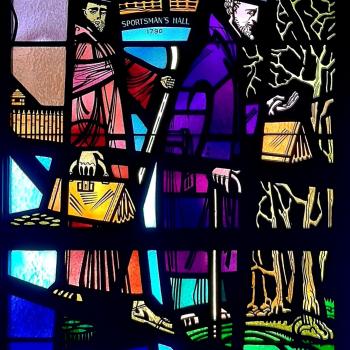Last week, I wrote about making my life promise as a Lay Cistercian, a type of contemplative Christian who seeks spiritual guidance from monks of the Cistercian tradition. It occurs to me that despite the influence of some high profile Cistercians over the centuries (from Bernard of Clairvaux in the 12th century to Thomas Keating in our day), the spirituality of this reclusive monastic order is not nearly as well known as that of the Jesuits, Franciscans or Carmelites.
This is understandable, really, since the Cistercians are a cloistered monastic order, meaning that the monks themselves commit to a life of stability within the enclosure of a particular monastery, seldom traveling or even leaving the monastery grounds without good reason. That's not an absolute rule—indeed, I am looking forward to attending two lectures given by the Cistercian monk William Meninger when he visits Atlanta next week—but it is characteristic enough of Cistercian identity that most people will have to visit a monastery to meet a monk of this order (incidentally "Trappist" monks, fabled for their austerity as well as their Belgian ale, are a branch of the Cistercian family: all Trappist monks are Cistercians, but not all Cistercians are Trappists). So I thought I would say a word or two about Cistercian spirituality for those who may have never visited a monastery of this centuries-old tradition.
I am not a monk, and so when I write about Cistercian spirituality, I should qualify myself and note that I am speaking of Lay Cistercian spirituality—which takes the charisms (gifts) of the Cistercian tradition and adapts them for those who are not called to monastic life. Lay Cistercians are not "wannabe monks," for although we find wisdom and spiritual guidance from our monastic brothers and sisters, we are also clear that our calling keeps us in "the world"—with families, work obligations, and all the other trappings of mainstream society. But we also recognize that, since Cistercian spirituality begins in monasteries, we cannot truly embrace the Lay Cistercian life without being mentored by monks or nuns of this tradition. So all Lay Cistercians have, on some level, a connection with monks or nuns who have offered hospitality to lay people who come to them for spiritual guidance.
So what is Cistercian spirituality? And how can it be adapted to the life of a layperson outside of a monastery? To answer these questions, the concept of charisms is essential. In his book What Makes a Cistercian Monk?, Fr. Anthony Delisi lists a number of characteristic qualities central to Cistercian identity. These are understood as gifts from God—more than just a list of virtues that someone can decide to make their own (although, certainly, anyone could benefit from intentionally seeking to cultivate these values in their own life). Some of the Cistercian charisms include silence, solitude, simplicity, labor, obedience (primarily to Christ, but also to one's abbot or abbess), humility, hospitality, stability, patience, and ongoing conversion.
In 2008, at an international gathering of Lay Cistercians in Spain, a document was ratified which seeks to describe the particular charisms of Lay Cistercian identity. These include prayer and praise, confidence and abandonment to God, humility, obedience, poverty, chastity, austerity, simplicity, balance, silence, solitude, work, hospitality, service, stability and joy. So there is a clear overlap between how at least one monk has articulated Cistercian spirituality, and how laypersons have adapted that spirituality to life outside the cloister.
What is immediately apparent is that Cistercian spirituality, both inside and outside the monastery, lacks glamour or pizzazz. This is a spirituality that stresses peace and quiet, simplicity, and hard work. It lacks the colorful drama of a Carmelite saint like Teresa of Avila, or the romanticism of Francis of Assisi. The Cistercian constitution describes this way of life as "ordinary, obscure, and laborious." It can be described as a workhorse, not a show horse.
So why embrace such an unexciting path? Precisely because it is unexciting. Cistercian spirituality insists that our greatest joy, our heart's desire, our fulfillment in life, comes from God—not from fancy clothes, or impressive possessions, or a life filled with adventure. Not that there's anything wrong with these things! And certainly some Cistercians (Thomas Merton leaps to mind) have been paradoxes within their order, renowned writers and theologians who served God by not being very obscure or ordinary. But for the most part, someone drawn to the Cistercian way—whether as a monk or an ordinary layperson—is drawn to silence, to solitude, to simplicity, to a spiritual tradition that supports an uncluttered, behind-the-scenes way of life. For those who are called to such a path, anything else would be unthinkable. For Cistercian spirituality is not about all that is given up; rather, it is about letting go of everything that stands in the way of a life given generously to God.
12/2/2022 9:10:31 PM




